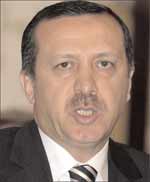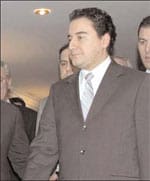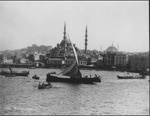The countrys reform program is on trackjust.

|
|
|
That atmosphere of uncertainty has been worsened by the evident inexperience of the leaders of the moderate Islamist AK party, in reality a grouping of disparate elements rather than a disciplined, centralized movement.
The good news on the IMF program is that, after much humming and hahing since its November election, the new government in April said it was committed to seeing the reforms through. The bad news: many of its actions seem to belie that claim.The party has repeatedly come under attack for moves widely deemed to help its supporters. In April, President Ahmed Necdet Sezer vetoed part of a tax amnesty bill which, intentionally or not, would have benefitted the Albayrak family, publishers of the pro-Islamic Yeni Safak newspaper.The partys populist leanings were reflected in immediate moves to raise the state pension and minimum wage and boost key subsidies. That whiff of pork-barrel politics tainted negotiations with the IMF over the next stage of the aid package; the new IMF agreement stipulates that the $4billion of new money will be disbursed, only in smaller amounts and after more frequent reviews.
As part of the agreement, the government also managed to unfreeze some $1.2 billion of blocked development loans from the World Bank.
Turkeys leaders have to navigate those shallows while keeping the economy running at full tilt.The IMF program is based on a 5% rise in GDP during 2003 but thats not enough to keep the countrys jobless queues from growing, according to the prime minister, Recep Tayyip Erdogan. A much more ambitious growth performance is needed in order to reduce unemployment, he says, arguing that only a repeat of last years 6.8% growth rate will do.
An April poll of Turkish finance and industry leaders put expected growth at just 3.3% for the yearat the high end of the range predicted by international observers. If theyre right,then Turkey is in trouble. Hulking over every move that policymakers make is the countrys debt burden$ 153 billion of IOUs at the end of 2002, or 84% of GNP.The government has to pay back or roll over $93.5 billion this year alone. That means crippling interest rates have to be brought downand that can only be done if international investors think the Turkish government means business.
Some take comfort from structural reforms that have isolated key parts of the Turkish economy from political interference. Tolga Egemen, an executive vice president responsible for international banking at Garanti Bank in Istanbul, points out that the central bank is now independenta status it underlined during the election period by refusing to print money in the traditional vote-winning manner.Its the first time Turkey has hit an inflation target despite an early election, says Egemen. He points out that Turkeys state banks also kept the money spigots closed tight; in the past, elections have spurred a flood of soft loans to politically sensitive areas of the economy. Some observers argue that despite the hiccups, there is a genuine commitment to change in Turkey.
Everyone is for the reforms, says Huseyin Imece, executive vice president at Yapi Kredi Bank. Its very rare you hear the old issues raised.
Translating that message to overseas investors may present problems.Turkeys record in attracting foreign direct investment has been notoriously woeful, with overseas companies put off by the prospect of unequal treatment by home-town regulators and judges.
In April Is-Tim, a cellphone operator 49%-owned by TIM of Italy, filed a $3 billion suit against the telecom watchdog for failing to hold the ring against domestic competitors such as Telsim, an operator owned by the controversial Uzan family, themselves embroiled in a lawsuit with Motorola of the US.
Some progress has been made in dismantling the carapace of legal and semi-legal obstacles that protect the Turkish economy from foreign competition. Foreigners can now own Turkish land for the first time, for example.
Improving the investment environment is crucial to the success of an ambitious privatization program, set to raise $4 billion in 2003, and including heavyweights such as state tobacco and drinks company Tekel, oil company Tupras and perennial bridesmaid Turk Telekom. We are counting on privatizations to boost state revenues, says economy minister Ali Babacan.We have a very good level of interest, said finance minister Kemal Unakitan. Maybe, but international observers say the sell-off program will be anything but a cakewalk. Turkish Airlines and Turk Telekom are in industries in which buyers are scarce right now. Even where biding is intensethe government has already received five offers for petrochemical company Petkimit may be forced to sell below its true value because its needs cash quickly.
The most likely source of interest for Tupras is cashrich Russian oil majors, likely to stir up discontent in still strongly nationalist Turkey. But there are clear signs that the government is preparing to bite the bullet; prime minister Erdogan met Viktor Vekselberg, CEO of Russian oil group TNK in April.
Oil concerns will be sold by tender; Turk Telekoms privatization is likely to be by means of a convertible bond backed by 25% of the companys shares.
| |||
|
Banking Sector Stabilizes

|
|
|
Some banks nearly didnt make it.Yapi Kredi Bank is one of Turkeys four leading private sector banks, with enviable market shares in sectors such as credit cards, and highly-regarded management. But it had an Achilles heel, in the shape of Cukurova Holdings, an industrial conglomerate that owned a 42% stake in the bank. As with similar banks the owners tended to regard it an inhouse treasury.The 2001 financial crisis underlined the folly of this approach when bad loansmostly to the Cukurova Groupballooned.
It really was very, very bad, says Yapi Kredi secretary general Salih Basaga, talking about the summer of 2002 when the bank was assailed by rumors about its financial health.The bank escaped being taken over by the banking regulator after restructuring around $2 billion owed to it by its parent.The price they had to pay: an agreement to reduce the Cukorova stake to below 10% by 2005.Thats not going to be easy in the current environment.
For the banking sector as a whole, the challenge will be to build businesses that resemble models in other marketswith diversified revenue streams rather than undue reliance on trading government paper. That wont be easy, either.Turkeys banks typically dont have much free capitalthe $11 billion of equity in the system at the end of September 2002 amounted to just 9% of total assets. The leading banks have ready access to international borrowingGarantis Egemen pointed out his bank could raise money abroad even at the height of the crisis. But theres little sign that even a leaner, fitter banking sector is ready to become the engine of growth the Turkish economy so desperately needs. Loan volumes shrank dramatically during the crisis, reducing an already low level of intermediation. Commercial bank loan advances totaled just 14% of GDP at the end of 2002, way below international levels. Thats unlikely to change much in the near future. With large amounts of banks assets in zero-weighted paper, capital ratios are skewed by international standards.
Advancing private sector credits is expensive in capital terms. Should the banks grow their lending, the higher share of risk assets will increase and cause current capital adequacy ratios to fall, says S&P;s Emmanuel Volland. Thats not all that is stopping much-needed loan growth. While Turkish companies want to borrow, the countrys banks are reluctant to lend.Were still not comfortable with the balance sheets of Turkish corporates, says Egemen. He points out that many companies still play Treasury bill markets, for example.
With the banking sector put on a much more secure footing, and some key structural reforms in place, all eyes are on the high wire progress of the government. But deeper down, there are still fundamental shifts needed in the relationship between the state, lenders and the real economy. Turkeys banks may have ceased to be the problem, but theyve yet to become part of the solution.
Mark Johnson




